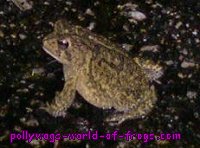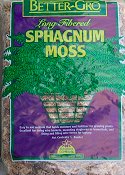Frog Glossary Q
Frog Glossary R
 Race: A sub-species within a species.
Race: A sub-species within a species.
Rainchamber: A large glass or acrylic
tank that is specifically designed to induce breeding amoung a colony of
frogs. See the page Rainchamber
for more on this.
Ranid: A true frog, also called "Rana".
Some True frogs include Bullfrogs, Green frogs and Leopard Frogs.
Reagent: A substance used in a chemical
reaction to detect, measure, or yield other substances.
Rugose: Not smooth. Instead, wrinkled or tuberculate.
Saproglenia: Belonging to the order Peronosporales,
Saproglenia are a terrestrial fungi, or earth-based; develop their entire life
cycle on living hosts and cannot be grown in laboratory culture. Of great economic
importance, two of which have had a great impact on human affairs. Both Phytophthora
infestans and Plasmopara viticola pass their entire life cycle inside the tissues
of their plant hosts and produce sporangia on the host surface.
This harmful fungus creates a threat to the frogs' eggs, tadpoles and frogs.
Saprophytic:Deriving nutrients and/or support from
another object. Example being a mushroom, which is called a saprophyte, takes nourishment
from decaying leaf matter.
Saxicolous: Referring to "rock dwelling".
Scansorial: Capable of or adapted for climbing.

 Seat patch: An area of an amphibian's skin that
surrounds the vent. It is often more heavily pigmented and is the point of contact with
other surfaces when he rests. It is thought to be responsible for fluid intake
and the osmotic release of minerals and chemicals, similar to a human sweating.
Also called a drink-patch.
Seat patch: An area of an amphibian's skin that
surrounds the vent. It is often more heavily pigmented and is the point of contact with
other surfaces when he rests. It is thought to be responsible for fluid intake
and the osmotic release of minerals and chemicals, similar to a human sweating.
Also called a drink-patch.
Self-Cure: The process in which a host cures itself
of an infecting agent.
Septicemia: A condition in which infection is lead through
the blood stream. Blood poisioning. Cures are made with anti-microbial drugs, as it
is caused by bacteria and/or viruses.
![]()
![]() Click here for
Photos and more info.
Click here for
Photos and more info.
Short-ray: Violet & Blue light is the shortest wave-length of light.
(which incidentally, is why the sky appears blue.) Violet is measured at 455-390, blue at 492-455.
Red is the longest, and comes in at 780-622.
Sphagnum moss:
 Found in places like Home Garden centers, sphagnum moss is usually dried and then
used as a soil-less additive for plants like orchids and bromeliads.
It is wetted down and allowed to reconstitute before adding to a soil mix
or frog substrate. It can serve as a slight irritant to human skin, but fine for frogs.
Live sphagnum
moss can sometimes be found through mail order and Online, where small
flats of it are excellent for use as vivarium bed-cover. Dried type is also used by
froggers as a "morph mat" when trying to breed a particular
species. It is even required for some morphs, as it has a high
tannin content which the froglets need in order to grow.
Found in places like Home Garden centers, sphagnum moss is usually dried and then
used as a soil-less additive for plants like orchids and bromeliads.
It is wetted down and allowed to reconstitute before adding to a soil mix
or frog substrate. It can serve as a slight irritant to human skin, but fine for frogs.
Live sphagnum
moss can sometimes be found through mail order and Online, where small
flats of it are excellent for use as vivarium bed-cover. Dried type is also used by
froggers as a "morph mat" when trying to breed a particular
species. It is even required for some morphs, as it has a high
tannin content which the froglets need in order to grow.
Species: A group of similar creatures that produce viable young when breeding.
The taxonomic designation that falls between genus and above subspecies.
Sterile earth: Soil that has been sterilized by heat.
The heat kills the parasites and other pathogens.
Subdigital: Beneath the toes.
Subspecies: The subdivision of a species. A race
may differ sligtly in color, size, scalation, or other features.
Sulfa drugs: A group of drugs that slow bacterial growth. They stop the
growth of folic acid.
Supratympanal: Positioned above the typanum
(the external eardrum)
Supercilliary: Positioned on the upper eyelid.
Sympatric: Occuring in the same geographical area.
Systemic: Means to affect the entire body, not just one area.

